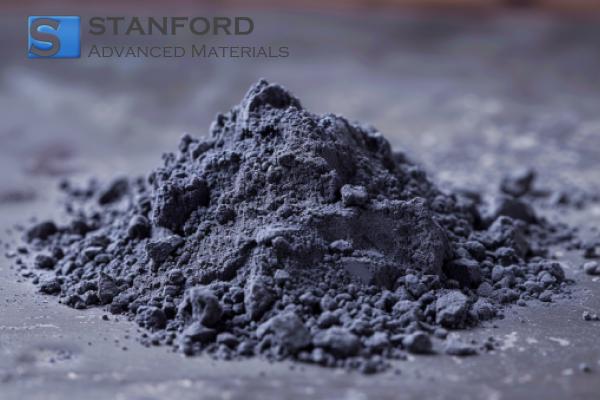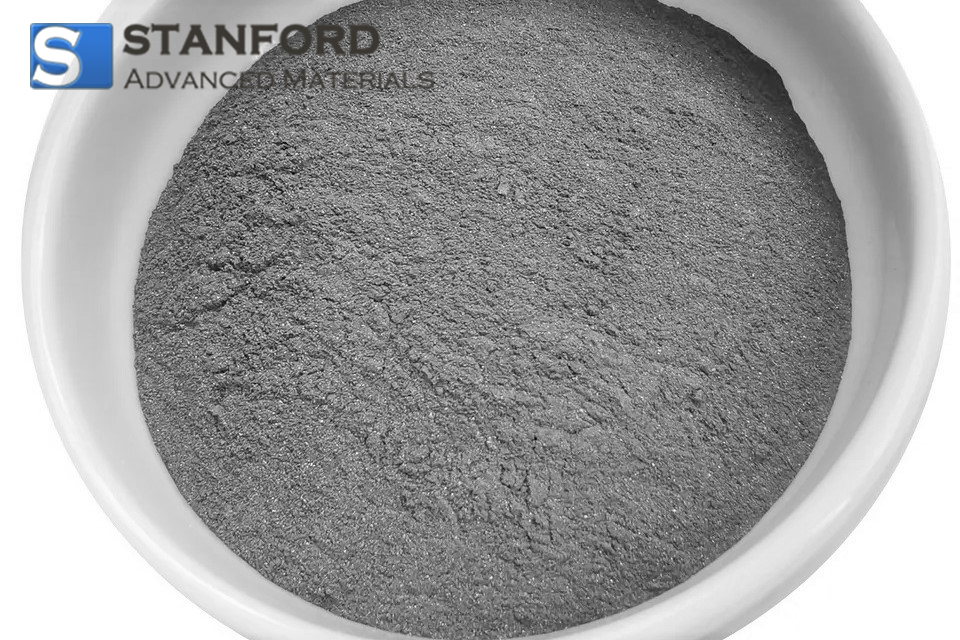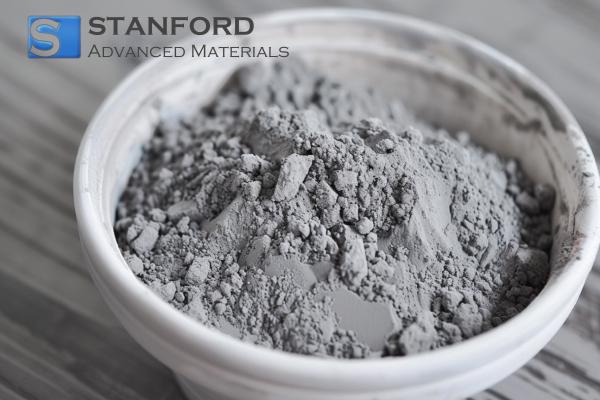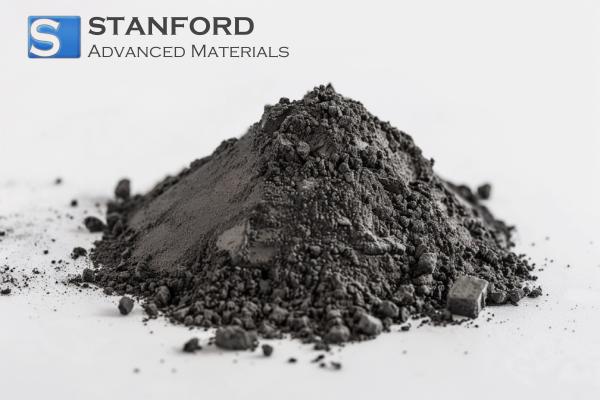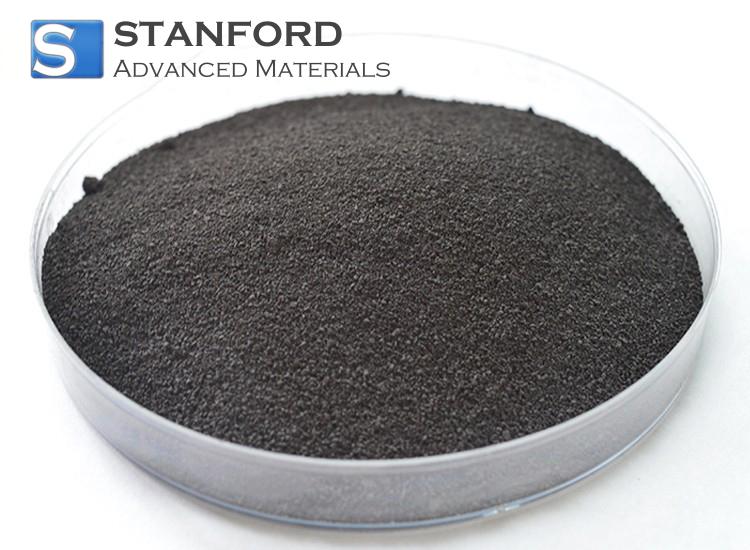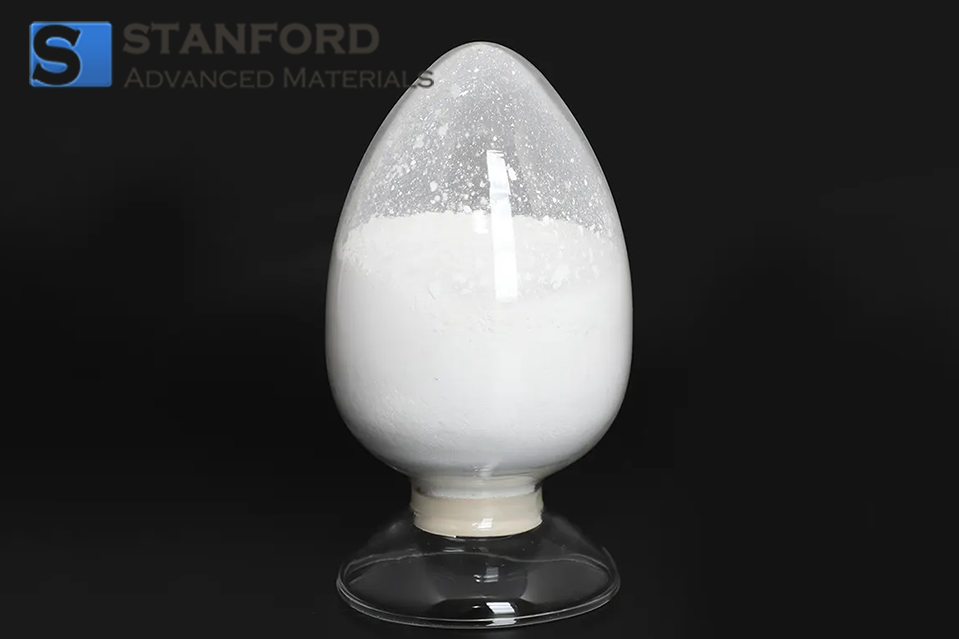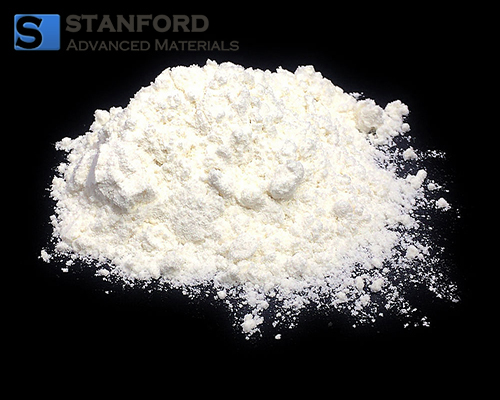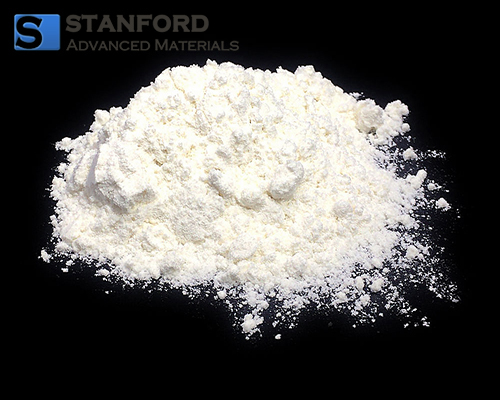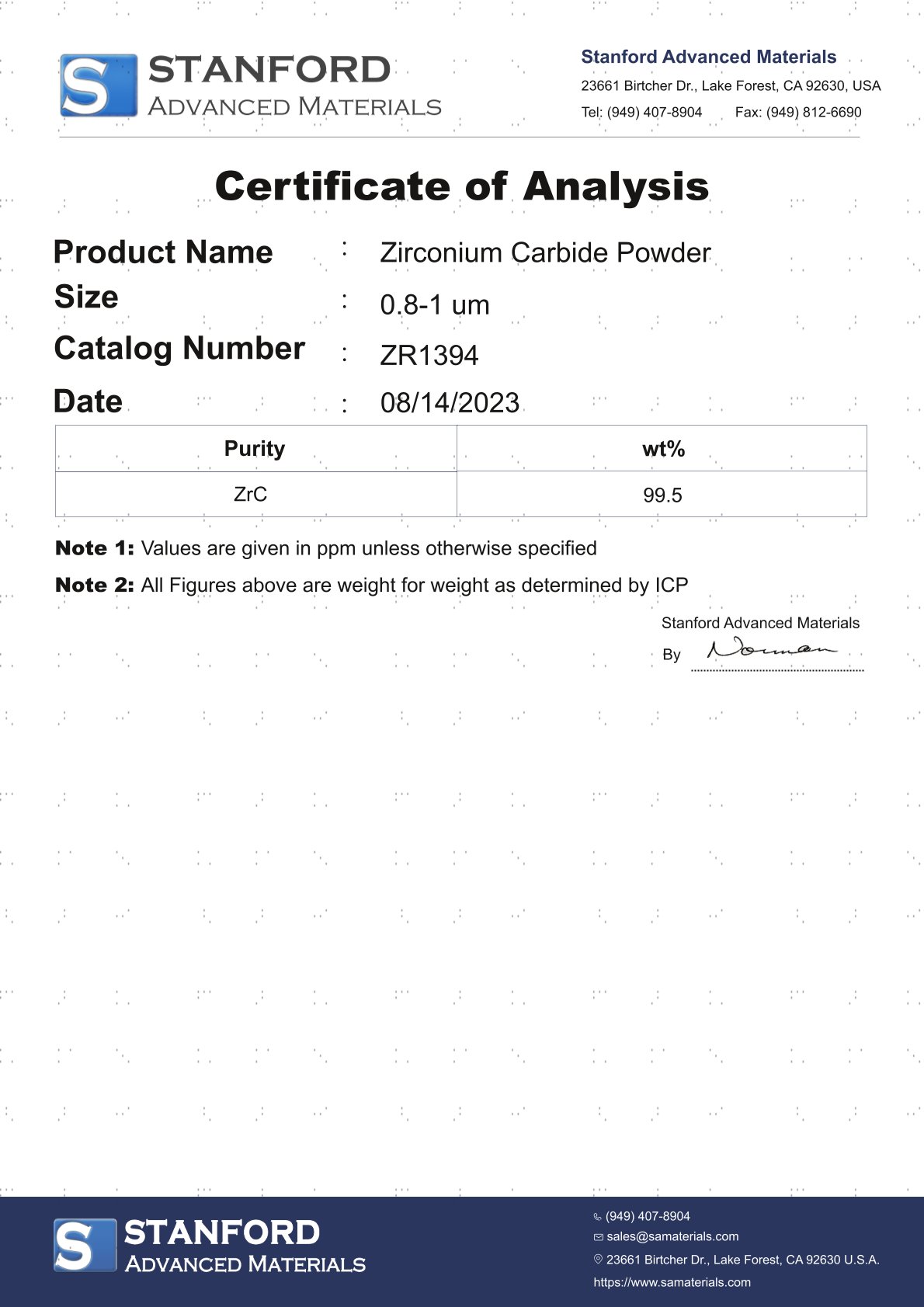SECTION 1. IDENTIFICATION
Product Name: Zirconium Carbide
CAS #: 12070-14-3
Relevant identified uses of the substance: Scientific research and development
Supplier details:
Stanford Advanced Materials
E-mail: sales@samaterials.com
Tel: (949) 407-8904
Address: 23661 Birtcher Dr., Lake Forest, CA 92630 U.S.A.
SECTION 2. HAZARDS IDENTIFICATION
Accute Health Effects: Irritating to the skin and eyes on contact. Inhalation will cause irritation to the
lungs and mucus membrane. Irritation to the eyes will cause watering and redness. Reddening,
scaling, and itching are characteristics of skin inflammation. Follow safe industrial hygiene practices
and always wear protective equipment when handling this compound.
Chronic Health Effects: This product has no known chronic effects. Repeated or prolong exposure to
this compound is not known to aggravate medical conditions.
Accute Health Effects: This product is not listed by NTP, IARC or regulated as a Carcinogen by
OSHA.
SECTION 3. COMPOSITION/INFORMATION ON INGREDIENTS
Substances
(CAS#) Description:
Zirconium carbide (CAS# 12070-14-3): 100%
Identification number(s):
EINECS Number: 235-125-1
Additional information:
Zirconium is routinely found with a low level of hafnium since separation of the two elements is difficult.
SECTION 4. FIRST AID MEASURES
Description of first aid measures
If inhaled:
Supply patient with fresh air. If not breathing, provide artificial respiration. Keep patient warm.
Seek immediate medical advice.
In case of skin contact:
Immediately wash with soap and water; rinse thoroughly.
Seek immediate medical advice.
In case of eye contact:
Rinse opened eye for several minutes under running water. Consult a physician.
If swallowed:
Seek immediate medical advice.
SECTION 5. FIREFIGHTING MEASURES
Extinguishing media
Suitable extinguishing agents
In case of fire, use sand, carbon dioxide or powdered extinguishing agent. Never use water.
For safety reasons unsuitable extinguishing agents Water
Special hazards arising from the substance or mixture
In case of fire, the following can be released:
Metal oxide fume
Carbon monoxide and carbon dioxide
Advice for firefighters
Protective equipment:
Wear self-contained respirator.
Wear fully protective impervious suit.
SECTION 6. ACCIDENTAL RELEASE MEASURES
Personal precautions, protective equipment and emergency procedures
Use personal protective equipment. Keep unprotected persons away.
Ensure adequate ventilation
Keep away from ignition sources
Environmental precautions:
Do not allow material to be released to the environment without official permits.
Methods and materials for containment and cleanup:
Ensure adequate ventilation.
Do not flush with water or aqueous cleansing agents
Keep away from ignition sources.
Reference to other sections
See Section 7 for information on safe handling
See Section 8 for information on personal protection equipment.
See Section 13 for disposal information.
SECTION 7. HANDLING AND STORAGE
Handling
Precautions for safe handling
Handle under dry protective gas.
Keep container tightly sealed.
Store in cool, dry place in tightly closed containers.
Ensure good ventilation at the workplace.
Information about protection against explosions and fires:
Keep ignition sources away.
Protect against electrostatic charges.
Fumes can combine with air to form an explosive mixture.
Conditions for safe storage, including any incompatibilities
Requirements to be met by storerooms and receptacles: Store in a cool location.
Information about storage in one common storage facility:
Store away from air.
Store away from oxidizing agents.
Further information about storage conditions:
Store under dry inert gas.
Keep container tightly sealed.
Store in cool, dry conditions in well-sealed containers.
This product is air sensitive.
SECTION 8. EXPOSURE CONTROLS/PERSONAL PROTECTION
Additional information about design of technical systems:
Properly operating chemical fume hood designed for hazardous chemicals and having an average
face velocity of at least 100 feet per minute.
Control parameters
Components with limit values that require monitoring at the workplace:
Zirconium and compounds, as Zr
mg/m3
ACGIH TLV 5; 10-STEL
Austria MAK 5
Denmark TWA 5
Finland TWA 5
Hungary 5-STEL
Korea TLV 5
Poland TWA 5; 10-STEL
Russia 5-STEL
OSHA PEL 5
Additional information: No data
Exposure controls
Personal protective equipment
Follow typical protective and hygienic practices for handling chemicals.
Keep away from foodstuffs, beverages and feed.
Remove all soiled and contaminated clothing immediately.
Wash hands before breaks and at the end of work.
Breathing equipment: Use suitable respirator when high concentrations are present.
Protection of hands:
Impervious gloves
Inspect gloves prior to use.
Material of glovesThe selection of suitable gloves not only depends on the material, but also on quality.
Quality will vary from manufacturer to manufacturer.
Eye protection: Safety glasses
Body protection: Protective work clothing.
SECTION 9. PHYSICAL AND CHEMICAL PROPERTIES
Information on basic physical and chemical properties
Appearance:
Form: Solid in various forms
Color: Grey
Odor: Odorless
Odor threshold: No data available.
pH: N/A
Melting point/Melting range: 3540°C (6404 °F)
Boiling point/Boiling range: No data available
Sublimation temperature / start: No data available
Flash point: N/A
Flammability (solid, gas) Highly flammable.
Ignition temperature: No data available
Decomposition temperature: No data available
Autoignition: No data available.
Explosion limits:
Lower: No data available
Upper: No data available
Vapor pressure: N/A
Density at 20°C (68 °F): 6.73 g/cm
3
(56.162 lbs/gal)
Relative density No data available.
Vapor density N/A
Evaporation rate N/A
Solubility in / Miscibility with
Water: Insoluble
Segregation coefficient (n-octonol/water): No data available.
Viscosity:
Dynamic: N/A
Kinematic: N/A
Other information No data available
SECTION 10. STABILITY AND REACTIVITY
Reactivity
Chemical stability
Thermal decomposition / conditions to be avoided:
Decomposition will not occur if used and stored according to specifications.
Possibility of hazardous reactions No dangerous reactions known
Incompatible materials:
Air
Oxidizing agents
Hazardous decomposition products:
Metal oxide fume
Carbon monoxide and carbon dioxide
SECTION 11. TOXICOLOGICAL INFORMATION
Information on toxicological effects
Acute toxicity:
The Registry of Toxic Effects of Chemical Substances (RTECS) contains acute toxicity data for this
substance.
LD/LC50 values that are relevant for classification: No data
Skin irritation or corrosion: May cause irritation
Eye irritation or corrosion: May cause irritation
Sensitization: No sensitizing effects known.
Germ cell mutagenicity: No effects known.
Carcinogenicity:
ACGIH A4: Not classifiable as a human carcinogen: Inadequate data on which to classify the agent in
terms of its carcinogenicity in humans and/or animals.
Reproductive toxicity: No effects known.
Specific target organ system toxicity - repeated exposure: No effects known.
Specific target organ system toxicity - single exposure: No effects known.
Aspiration hazard: No effects known.
Subacute to chronic toxicity: No effects known.
Additional toxicological information:
To the best of our knowledge the acute and chronic toxicity of this substance is not fully known.
SECTION 12. ECOLOGICAL INFORMATION
Toxicity
Acquatic toxicity: No data available
Persistence and degradability No data available
Behavior in environmental systems:
Bioaccumulative potential No data available
Mobility in soil No data available
Additional ecological information:
Do not allow material to be released to the environment without official permits.
Results of PBT and vPvB assessment
PBT: N/A
vPvB: N/A
Other adverse effects No data available
SECTION 13. DISPOSAL CONSIDERATIONS
Waste treatment methods
Recommendation
Consult official regulations to ensure proper disposal.
Uncleaned packagings:
Recommendation:
Disposal must be made according to official regulations.
SECTION 14. TRANSPORT INFORMATION
DOT
Proper Shipping Name: None
Non-Hazardous for Transport: This substance is considered to be non-hazardous for transport.
IATA
Non-Hazardous for Air Transport: Non-hazardous for air transport.
SECTION 15. REGULATORY INFORMATION
Safety, health and environmental regulations/legislation specific for the substance or mixture
Product related hazard informations:
Hazard symbols:
F Highly flammable
Risk phrases:
11 Highly flammable.
Safety phrases:
7 Keep container tightly closed.
33 Take precautionary measures against static discharges.
43 In case of fire, use sand, carbon dioxide or powdered extinguishing agent. Never use water.
60 This material and its container must be disposed of as hazardous waste.
National regulations
All components of this product are listed in the U.S. Environmental Protection Agency Toxic
Substances Control Act Chemical substance Inventory.
Information about limitation of use: For use only by technically qualified individuals.
Chemical safety assessment: A Chemical Safety Assessment has not been carried out.
SECTION 16. OTHER INFORMATION
Safety Data Sheet according to Regulation (EC) No. 1907/2006 (REACH). The above information is
believed to be correct but does not purport to be all inclusive and shall be used only as a guide. The
information in this document is based on the present state of our knowledge and is applicable to the
product with regard to appropriate safety precautions. It does not represent any guarantee of the
properties of the product.
